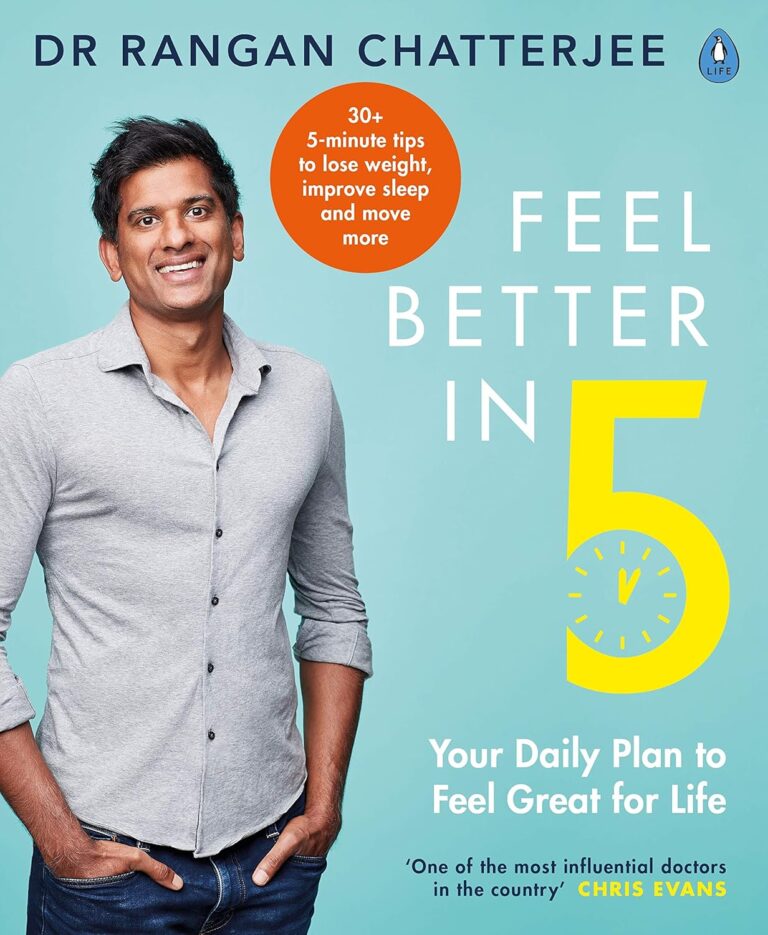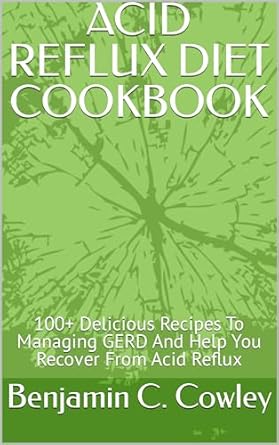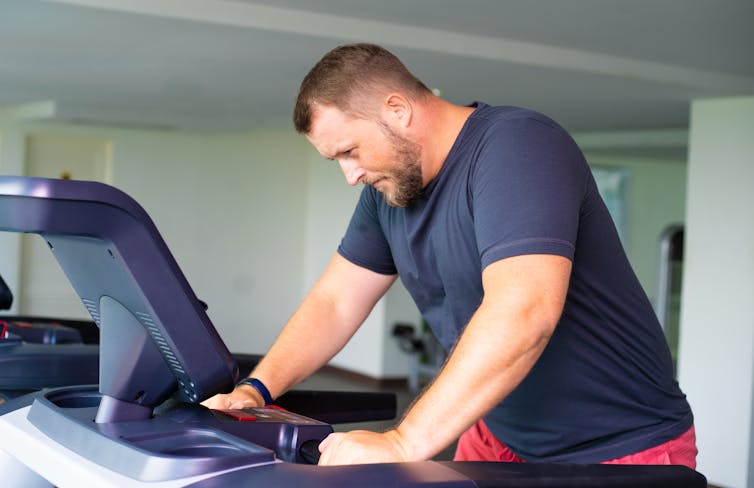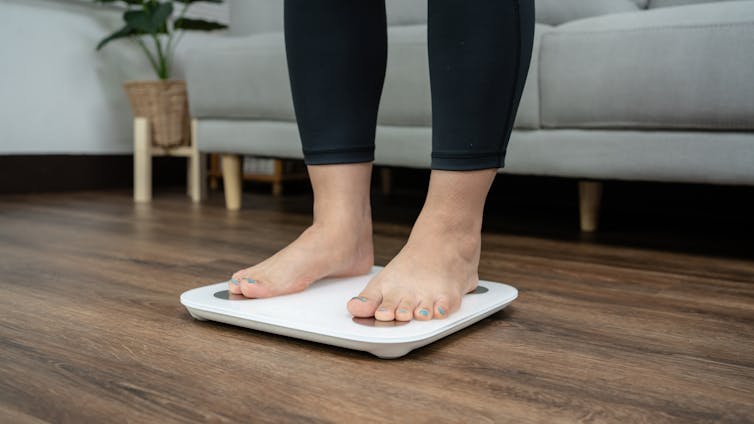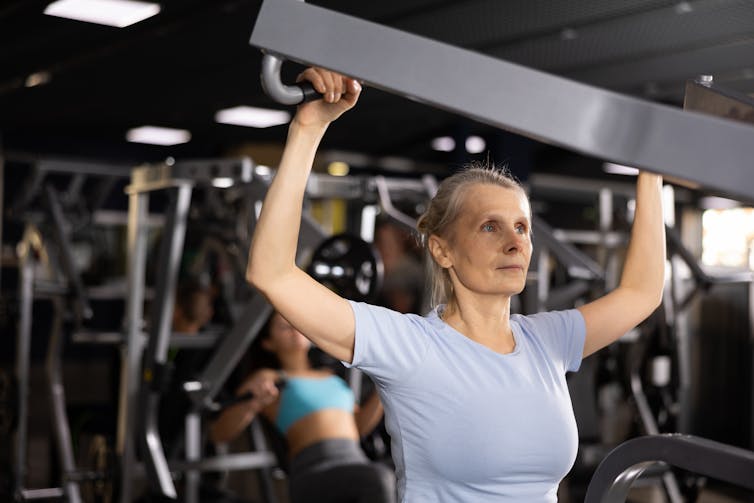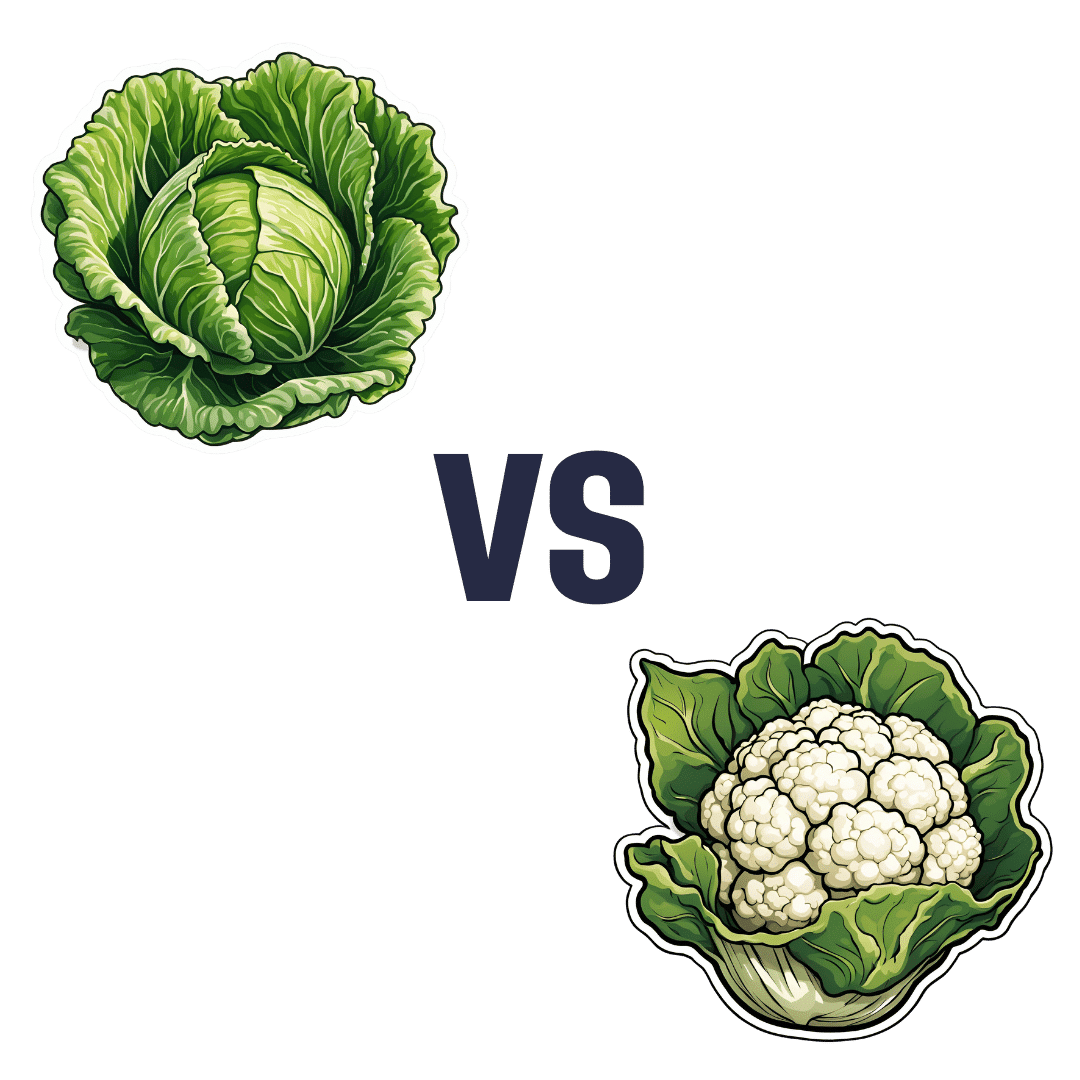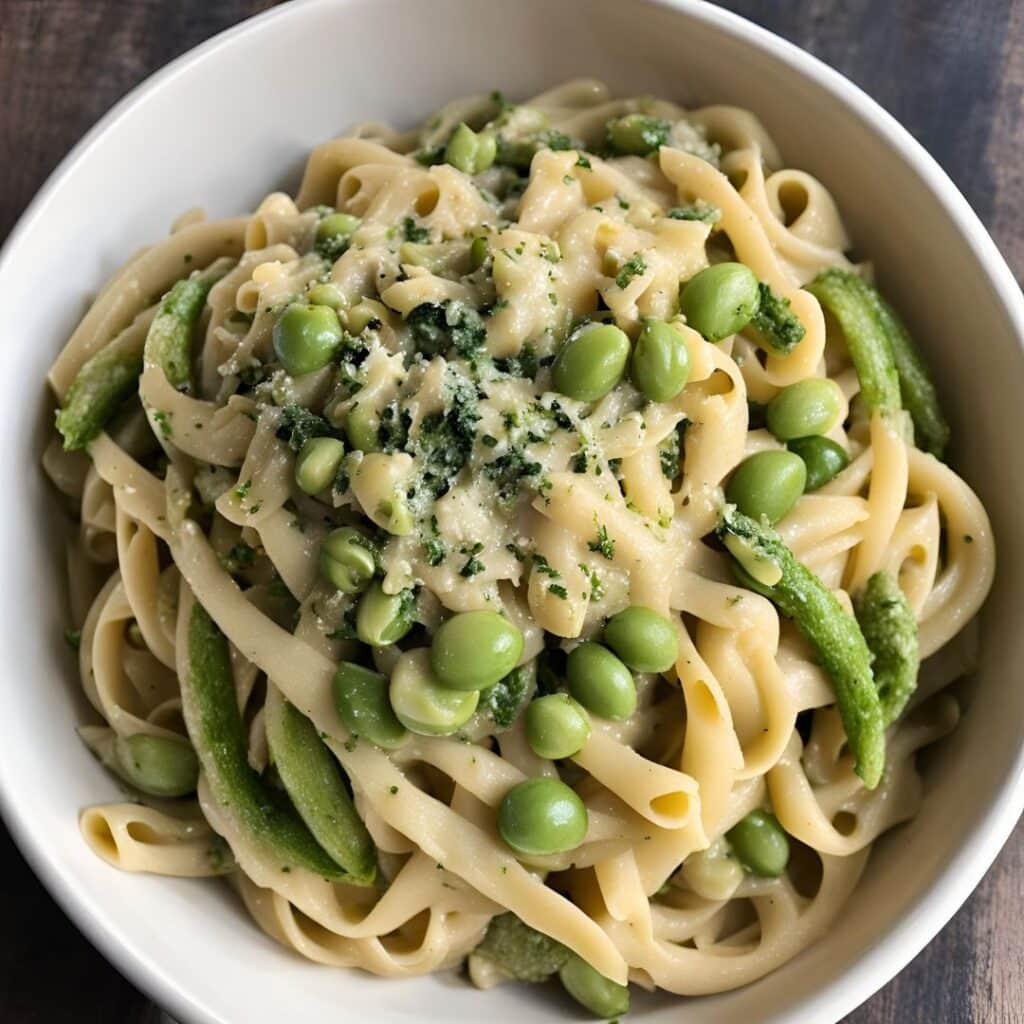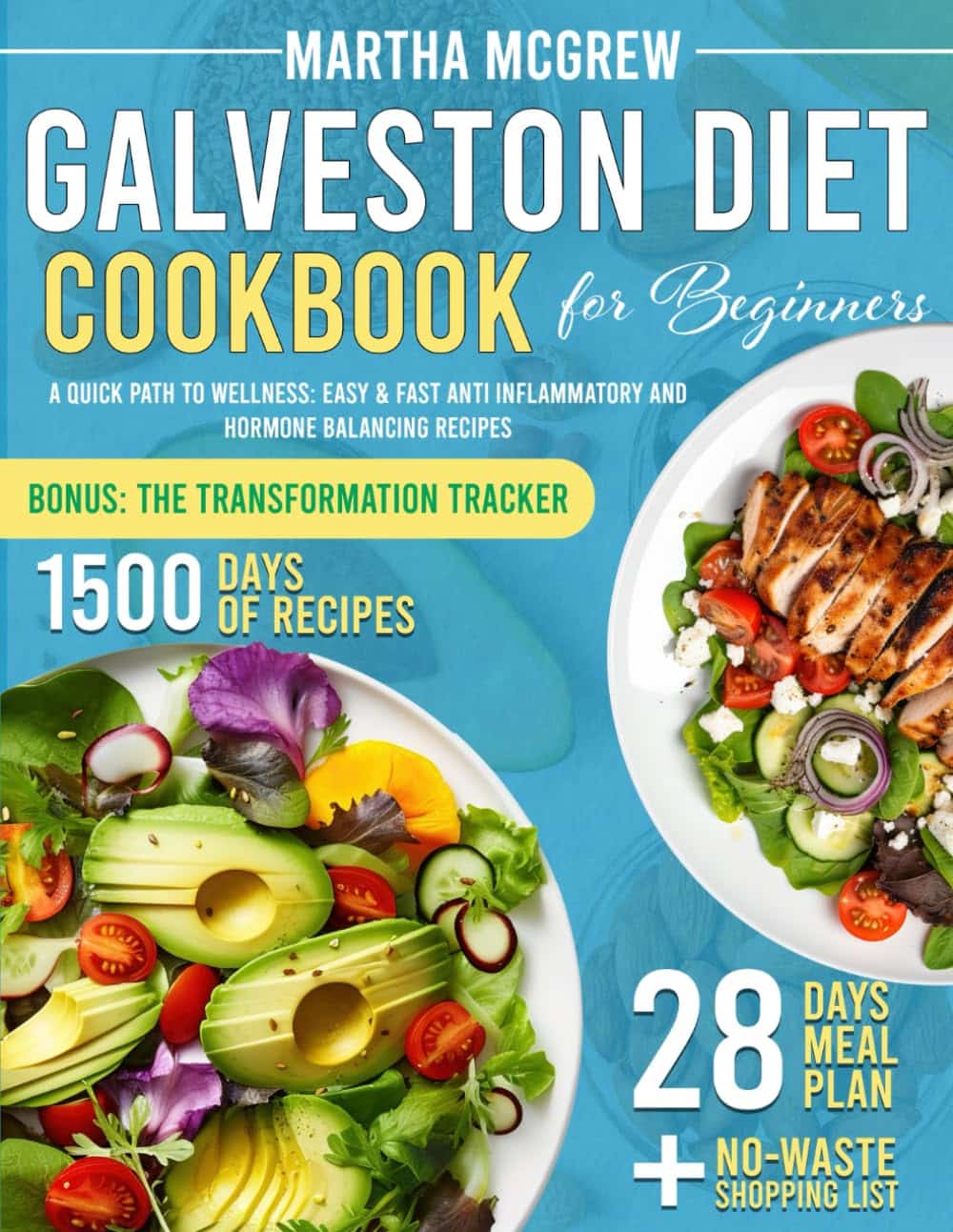
Galveston Diet Cookbook for Beginners – by Martha McGrew
10almonds is reader-supported. We may, at no cost to you, receive a portion of sales if you purchase a product through a link in this article.
We recently reviewed “The Galveston Diet”, and here’s a cookbook (by a nutritionist) to support that.
For the most part, it’s essentially keto-leaning, with an emphasis on protein and fats, but without quite the carb-cut that keto tends to have. It’s also quite plant-centric, but it’s not by default vegan or even vegetarian; you will find meat and fish in here. As you might expect from an anti-inflammatory cookbook, it’s light on the dairy too, though fermented dairy products such as yogurt do feature as well.
The recipes are quite simple and easy to follow, with suggestions of alternative ingredients along the way, making for extra variety as well as convenience.
If you are going to buy this book, you might want to take a look at the buying options, to ensure you get a full-color version, as recent reprints have photos in black and white, whereas older runs have color throughout.
Bottom line: if you’d like to cook the Galveston Diet way, this is as good a way to start as any.
Click here to check out the Galveston Diet Cookbook for Beginners, and get cooking!
Don’t Forget…
Did you arrive here from our newsletter? Don’t forget to return to the email to continue learning!
Recommended
Learn to Age Gracefully
Join the 98k+ American women taking control of their health & aging with our 100% free (and fun!) daily emails:
-
Increase in online ADHD diagnoses for kids poses ethical questions
10almonds is reader-supported. We may, at no cost to you, receive a portion of sales if you purchase a product through a link in this article.
In 2020, in the midst of a pandemic, clinical protocols were altered for Ontario health clinics, allowing them to perform more types of care virtually. This included ADHD assessments and ADHD prescriptions for children – services that previously had been restricted to in-person appointments. But while other restrictions on virtual care are back, clinics are still allowed to virtually assess children for ADHD.
This shift has allowed for more and quicker diagnoses – though not covered by provincial insurance (OHIP) – via a host of newly emerging private, for-profit clinics. However, it also has raised significant ethical questions.
It solves an equity issue in terms of rural access to timely assessments, but does it also create new equity issues as a privatized service?
Is it even feasible to diagnose a child for a condition like ADHD without meeting that child in person?
And as rates of ADHD diagnosis continue to rise, should health regulators re-examine the virtual care approach?
Ontario: More prescriptions, less regulation
There are numerous for-profit clinics offering virtual diagnoses and prescriptions for childhood ADHD in Ontario. These include KixCare, which does not offer the option of an in-person assessment. Another clinic, Springboard, makes virtual appointments available within days, charging around $2,600 for assessments, which take three to four hours. The clinic offers coaching and therapy at an additional cost, also not covered by OHIP. Families can choose to continue to visit the clinic virtually during a trial stage with medications, prescribed by a doctor in the clinic who then sends prescribing information back to the child’s primary care provider.
For-profit clinics like these are departing from Canada’s traditional single-payer health care model. By charging patients out-of-pocket fees for services, the clinics are able to generate more revenue because they are working outside of the billing standards for OHIP, standards that set limits on the maximum amount doctors can earn for providing specific services. Instead many services are provided by non-physician providers, who are not limited by OHIP in the same way.
Need for safeguards
ADHD prescriptions rose during the pandemic in Ontario, with women, people of higher income and those aged 20 to 24 receiving the most new diagnoses, according to research published in January 2024 by a team including researchers from the Centre for Addictions and Mental Health and Holland Bloorview Children’s Hospital. There may be numerous reasons for this increase but could the move to virtual care have been a factor?
Ontario psychiatrist Javeed Sukhera, who treats both children and adults in Canada and the U.S., says virtual assessments can work for youth with ADHD, who may receive treatment quicker if they live in remote areas. However, he is concerned that as health care becomes more privatized, it will lead to exploitation and over-diagnosis of certain conditions.
“There have been a lot of profiteers who have tried to capitalize on people’s needs and I think this is very dangerous,” he said. “In some settings, profiteering companies have set up systems to offer ADHD assessments that are almost always substandard. This is different from not-for-profit setups that adhere to quality standards and regulatory mechanisms.”
Sukhera’s concerns recall the case of Cerebral Inc., a New York state-based virtual care company founded in 2020 that marketed on social media platforms including Instagram and TikTok. Cerebral offered online prescriptions for ADHD drugs among other services and boasted more than 200,000 patients. But as Dani Blum reported in the New York Times, Cerebral was accused in 2023 of pressuring doctors on staff to prescribe stimulants and faced an investigation by state prosecutors into whether it violated the U.S. Controlled Substances Act.
“At the start of the pandemic, regulators relaxed rules around medical prescription of controlled substances,” wrote Blum. “Those changes opened the door for companies to prescribe and market drugs without the protocols that can accompany an in-person visit.”
Access increased – but is it equitable?
Virtual care has been a necessity in rural areas in Ontario since well before the pandemic, although ADHD assessments for children were restricted to in-person appointments prior to 2020.
But ADHD assessment clinics that charge families out-of-pocket for services are only accessible to people with higher incomes. Rural families, many of whom are low income, are unable to afford thousands for private assessments, let alone the other services upsold by providers. If the private clinic/virtual care trend continues to grow unchecked, it may also attract doctors away from the public model of care since they can bill more for services. This could further aggravate the gap in care that lower income people already experience.
This could further aggravate the gap in care that lower income people already experience.
Sukhera says some risks could be addressed by instituting OHIP coverage for services at private clinics (similar to private surgical facilities that offer mixed private/public coverage), but also with safeguards to ensure that profits are reinvested back into the health-care system.
“This would be especially useful for folks who do not have the income, the means to pay out of pocket,” he said.
Concerns of misdiagnosis and over-prescription
Some for-profit companies also benefit financially from diagnosing and issuing prescriptions, as has been suggested in the Cerebral case. If it is cheaper for a clinic to do shorter, virtual appointments and they are also motivated to diagnose and prescribe more, then controls need to be put in place to prevent misdiagnosis.
The problem of misdiagnosis may also be related to the nature of ADHD assessments themselves. University of Strathclyde professor Matthew Smith, author of Hyperactive: The Controversial History of ADHD, notes that since the publication of Diagnostic and Statistical Manual of Mental Disorders in 1980, assessment has typically involved a few hours of parents and patients providing their subjective perspectives on how they experience time, tasks and the world around them.
“It’s often a box-ticking exercise, rather than really learning about the context in which these behaviours exist,” Smith said. “The tendency has been to use a list of yes/no questions which – if enough are answered in the affirmative – lead to a diagnosis. When this is done online or via Zoom, there is even less opportunity to understand the context surrounding behaviour.”
Smith cited a 2023 BBC investigation in which reporter Rory Carson booked an in-person ADHD assessment at a clinic and was found not to have the condition, then had a private online assessment – from a provider on her couch in a tracksuit – and was diagnosed with ADHD after just 45 minutes, for a fee of £685.
What do patients want?
If Canadian regulators can effectively tackle the issue of privatization and the risk of misdiagnosis, there is still another hurdle: not every youth is willing to take part in virtual care.
Jennifer Reesman, a therapist and Training Director for Neuropsychology at the Chesapeake Center for ADHD, Learning & Behavioural Health in Maryland, echoed Sukhera’s concerns about substandard care, cautioning that virtual care is not suitable for some of her young clients who had poor experiences with online education and resist online health care. It can be an emotional issue for pediatric patients who are managing their feelings about the pandemic experience.
“We need to respect what their needs are, not just the needs of the provider,” says Reesman.
In 2020, Ontario opted for virtual care based on the capacity of our health system in a pandemic. Today, with a shortage of doctors, we are still in a crisis of capacity. The success of virtual care may rest on how engaged regulators are with equity issues, such as waitlists and access to care for rural dwellers, and how they resolve ethical problems around standards of care.
Children and youth are a distinct category, which is why we had restrictions on virtual ADHD diagnosis prior to the pandemic. A question remains, then: If we could snap our fingers and have the capacity to provide in-person ADHD care for all children, would we? If the answer to that question is yes, then how can we begin to build our capacity?
This article is republished from healthydebate under a Creative Commons license. Read the original article.
Share This Post
-
Acid Reflux Diet Cookbook – by Dr. Harmony Reynolds
10almonds is reader-supported. We may, at no cost to you, receive a portion of sales if you purchase a product through a link in this article.
Notwithstanding the title, this is far more than just a recipe book. Of course, it is common for health-focused recipe books to begin with a preamble about the science that’s going to be applied, but in this case, the science makes up a larger portion of the book than usual, along with practical tips about how to best implement certain things, at home and when out and about.
Dr. Reynolds also gives a lot of information about such things as medications that could be having an effect one way or the other, and even other lifestyle factors such as exercise and so forth, and yes, even stress management. Because for many people, what starts as acid reflux can soon become ulcers, and that’s not good.
The recipes themselves are diverse and fairly simple; they’re written solely with acid reflux in mind and not other health considerations, but they are mostly heathy in the generalized sense too.
The style is straight to the point with zero padding sensationalism, or chit-chat. It can make for a slightly dry read, but let’s face it, nobody is buying this book for its entertainment value.
Bottom line: if you have been troubled by acid reflux, this book will help you to eat your way safely out of it.
Click here to check out the Acid Reflux Diet Cookbook, and enjoy!
Share This Post
-
3 signs your diet is causing too much muscle loss – and what to do about it
10almonds is reader-supported. We may, at no cost to you, receive a portion of sales if you purchase a product through a link in this article.
When trying to lose weight, it’s natural to want to see quick results. So when the number on the scales drops rapidly, it seems like we’re on the right track.
But as with many things related to weight loss, there’s a flip side: rapid weight loss can result in a significant loss of muscle mass, as well as fat.
So how you can tell if you’re losing too much muscle and what can you do to prevent it?
EvMedvedeva/Shutterstock Why does muscle mass matter?
Muscle is an important factor in determining our metabolic rate: how much energy we burn at rest. This is determined by how much muscle and fat we have. Muscle is more metabolically active than fat, meaning it burns more calories.
When we diet to lose weight, we create a calorie deficit, where our bodies don’t get enough energy from the food we eat to meet our energy needs. Our bodies start breaking down our fat and muscle tissue for fuel.
A decrease in calorie-burning muscle mass slows our metabolism. This quickly slows the rate at which we lose weight and impacts our ability to maintain our weight long term.
How to tell you’re losing too much muscle
Unfortunately, measuring changes in muscle mass is not easy.
The most accurate tool is an enhanced form of X-ray called a dual-energy X-ray absorptiometry (DXA) scan. The scan is primarily used in medicine and research to capture data on weight, body fat, muscle mass and bone density.
But while DEXA is becoming more readily available at weight-loss clinics and gyms, it’s not cheap.
There are also many “smart” scales available for at home use that promise to provide an accurate reading of muscle mass percentage.
Some scales promise to tell us our muscle mass. Lee Charlie/Shutterstock However, the accuracy of these scales is questionable. Researchers found the scales tested massively over- or under-estimated fat and muscle mass.
Fortunately, there are three free but scientifically backed signs you may be losing too much muscle mass when you’re dieting.
1. You’re losing much more weight than expected each week
Losing a lot of weight rapidly is one of the early signs that your diet is too extreme and you’re losing too much muscle.
Rapid weight loss (of more than 1 kilogram per week) results in greater muscle mass loss than slow weight loss.
Slow weight loss better preserves muscle mass and often has the added benefit of greater fat mass loss.
One study compared people in the obese weight category who followed either a very low-calorie diet (500 calories per day) for five weeks or a low-calorie diet (1,250 calories per day) for 12 weeks. While both groups lost similar amounts of weight, participants following the very low-calorie diet (500 calories per day) for five weeks lost significantly more muscle mass.
2. You’re feeling tired and things feel more difficult
It sounds obvious, but feeling tired, sluggish and finding it hard to complete physical activities, such as working out or doing jobs around the house, is another strong signal you’re losing muscle.
Research shows a decrease in muscle mass may negatively impact your body’s physical performance.
3. You’re feeling moody
Mood swings and feeling anxious, stressed or depressed may also be signs you’re losing muscle mass.
Research on muscle loss due to ageing suggests low levels of muscle mass can negatively impact mental health and mood. This seems to stem from the relationship between low muscle mass and proteins called neurotrophins, which help regulate mood and feelings of wellbeing.
So how you can do to maintain muscle during weight loss?
Fortunately, there are also three actions you can take to maintain muscle mass when you’re following a calorie-restricted diet to lose weight.
1. Incorporate strength training into your exercise plan
While a broad exercise program is important to support overall weight loss, strength-building exercises are a surefire way to help prevent the loss of muscle mass. A meta-analysis of studies of older people with obesity found resistance training was able to prevent almost 100% of muscle loss from calorie restriction.
Relying on diet alone to lose weight will reduce muscle along with body fat, slowing your metabolism. So it’s essential to make sure you’ve incorporated sufficient and appropriate exercise into your weight-loss plan to hold onto your muscle mass stores.
Strength-building exercises help you retain muscle. BearFotos/Shutterstock But you don’t need to hit the gym. Exercises using body weight – such as push-ups, pull-ups, planks and air squats – are just as effective as lifting weights and using strength-building equipment.
Encouragingly, moderate-volume resistance training (three sets of ten repetitions for eight exercises) can be as effective as high-volume training (five sets of ten repetitions for eight exercises) for maintaining muscle when you’re following a calorie-restricted diet.
2. Eat more protein
Foods high in protein play an essential role in building and maintaining muscle mass, but research also shows these foods help prevent muscle loss when you’re following a calorie-restricted diet.
But this doesn’t mean just eating foods with protein. Meals need to be balanced and include a source of protein, wholegrain carb and healthy fat to meet our dietary needs. For example, eggs on wholegrain toast with avocado.
3. Slow your weight loss plan down
When we change our diet to lose weight, we take our body out of its comfort zone and trigger its survival response. It then counteracts weight loss, triggering several physiological responses to defend our body weight and “survive” starvation.
Our body’s survival mechanisms want us to regain lost weight to ensure we survive the next period of famine (dieting). Research shows that more than half of the weight lost by participants is regained within two years, and more than 80% of lost weight is regained within five years.
However, a slow and steady, stepped approach to weight loss, prevents our bodies from activating defence mechanisms to defend our weight when we try to lose weight.
Ultimately, losing weight long-term comes down to making gradual changes to your lifestyle to ensure you form habits that last a lifetime.
At the Boden Group, Charles Perkins Centre, we are studying the science of obesity and running clinical trials for weight loss. You can register here to express your interest.
Nick Fuller, Charles Perkins Centre Research Program Leader, University of Sydney
This article is republished from The Conversation under a Creative Commons license. Read the original article.
Share This Post
Related Posts
-
10 Ways To Delay Aging
10almonds is reader-supported. We may, at no cost to you, receive a portion of sales if you purchase a product through a link in this article.
This is Dr. Colin Rose; he is a Senior Associate of the Royal Society of Medicine. He’s also a main contributor to EduScience, a program funded by the E.U. which is designed to enhance the teaching and learning of science in schools in Europe.
His most recent work has been about aging—and how to delay it. We also reviewed his latest book, here:
Delay Ageing – by Dr. Colin Rose
So, what does he want us to know? The key lies in his compilation of ten ways in which we age on a cellular level, and what we can to do slow each one of those:
Damage to DNA accumulates
While DNA can get damaged without any external stimulus to cause that, there are a lot of modifiable factors that we can do to reduce DNA damage. The list is easy: if it causes cancer, it causes aging.
Thus, check out: Stop Cancer 20 Years Ago
Cells become senescent
Our cells are replaced all the time; some sooner than others, but all of them at some point. The problem occurs when cells are outliving their usefulness. If a cell becomes completely immortal, that is cancer, but happily most don’t. Nevertheless, having senescent (aging) cells in the body means that those senescent cells are what get copied forwards by mitosis, and our DNA becomes like a photocopy of a tattered old photocopy of a tattered old photocopy. Which, needless to say, is not good for our health. So, the best thing to do is to kill them earlier:
Yes, really: Fisetin: The Anti-Aging Assassin
Mitochondria become dysfunctional
Without properly functional mitochondria, no living human cell can do its job properly.
Options: 7 Ways To Boost Mitochondrial Health To Fight Disease
Beneficial genes are switched off, harmful genes are on
It’s easy to think of our genes as being immutable, but epigenetics means that our environment (amongst other factors) can mean that our gene expression changes.
Imagine it this way: your genes are a set of instructions for your body. However, your body will act or not on those instructions, depending on other factors. Hormones often play a big part in this; for example sex hormones tell the body which set of genetic instructions to read (and thus what kind of body to build/rebuild), and cortisol or oxytocin can tell the body which set of contingency plans to activate or suppress (respectively). A milder example is gray hair; genes have the program for it, but many other factors inform the body when, if, and how to do it.
Of more concern when it comes to aging is what goes on with more critical systems, such as the brain, in which the aforementioned DNA damage can cause unhelpful instructions to get interpreted, resulting in epigenetic changes that in turn facilitate age-related degeneration.
As to what can be done, see : Klotho: Unzipping The Genes Of Aging?
Stem cells become exhausted
Stem cells can become different kinds of cells, and thus they’re very useful for maintaining a healthy body. However, they get depleted with age. We can slow down the rate of loss, though; for example, intermittent fasting can help:
Per Dr. Li’s 5 Ways To Beat Cancer (And Other Diseases)
And for more detail, see:
Doctor’s Tip: Regeneration (stem cells) — one of your body’s five defense systems
(complete with lists of foods to eat or avoid for stem cell health)
Cells fail to communicate properly
Cells need to talk to each other constantly, to continue doing their jobs. We are one big organism, after all, and not a haphazard colony of the countless cells that constitute such. However, cell signalling gets worse with age, which in turn precipitates others age-related problems. Fortunately, there are nutrients that can improve cellular communication.
For example: PS, We Love You ← this is about phosphatidylserine, also called “PS”
Telomeres become shorter
These protective caps on our DNA suffer the wear-and-tear so that our DNA doesn’t have to. However, as they get shorter, the DNA can start suffering damage. For this reason, telomere length is considered one of the most “Gold Standard” markers of cellular aging.
Here’s what can be done for that: The Stress Prescription (Against Aging!)
The body fails to sense nutritional intake properly
This is mostly about insulin signalling (though problems can occur in other systems too, but we only have so much room here), so it’s important to take care of that.
See: Turn Back The Clock On Insulin Resistance
Proteins accumulate errors
This is due to DNA damage, of course, but there are specific things that can reduce protein error accumulation; see for example:
A quick fix – preventing protein errors extends lifespan
See also: Rapamycin Can Slow Aging By 20% (But Watch Out)
The microbiome becomes unbalanced
We at 10almonds often mention that gut health affects pretty much every other kind of health, and it’s true for aging as well. So, take care of that microbiome!
Here’s a primer: Gut Health 101
Want to know more about delaying aging beyond the cellular level?
Check out: Age & Aging: What Can (And Can’t) We Do About It?
Take care!
Don’t Forget…
Did you arrive here from our newsletter? Don’t forget to return to the email to continue learning!
Learn to Age Gracefully
Join the 98k+ American women taking control of their health & aging with our 100% free (and fun!) daily emails:
-
Cabbage vs Cauliflower – Which is Healthier?
10almonds is reader-supported. We may, at no cost to you, receive a portion of sales if you purchase a product through a link in this article.
Our Verdict
When comparing cabbage to cauliflower, we picked the cauliflower.
Why?
First, let’s note: these are two different cultivars of the same species (Brassica oleracea) and/but as usual (we say, as there are a lot of cultivars of Brassica oleracea, and we’ve done a fair few pairings of them before) there are still nutritional differences to consider, such as…
In terms of macros, cabbage has very slightly more carbs and fiber, while cauliflower has very slightly more protein. However, the numbers are all so close (and the glycemic index equal), such that we’re going to call the macros category a tie.
In the category of vitamins, cabbage has more of vitamins A, B1, E, and K, while cauliflower has more of vitamins B2, B3, B5, B6, B7, B9, C, and choline. Superficially, this is a clear 8:4 win for cauliflower; it’s worth noting though that the differences in amounts are mostly small, so this isn’t as big a win as it looks like. Still a win for cauliflower, though.
When it comes to minerals, it’s a similar story: cabbage has a little more calcium, iron, and manganese, while cauliflower has a little more copper, magnesium, phosphorus, potassium, and zinc. This time a 6:3 win for cauliflower, and again, the margins are small so there’s really not as much between them as it looks like. Still a win for cauliflower, though.
In short: enjoy either or both (diversity is good), but the most nutritionally dense is cauliflower, even if cabbage isn’t far behind it.
Want to learn more?
You might like to read:
What’s Your Plant Diversity Score?
Take care!
Don’t Forget…
Did you arrive here from our newsletter? Don’t forget to return to the email to continue learning!
Learn to Age Gracefully
Join the 98k+ American women taking control of their health & aging with our 100% free (and fun!) daily emails:
-
Creamy Zucchini, Edamame, & Asparagus Linguine
10almonds is reader-supported. We may, at no cost to you, receive a portion of sales if you purchase a product through a link in this article.
Protein, fiber, and polyphenols are the dish of the day here:
You will need
- 1½ cups milk (your choice what kind; we recommend soy for its neutral taste, though hazelnut’s nutty flavor would also work in this recipe)
- 6 oz wholegrain linguine (or your pasta of choice)
- 2 zucchini, thinly sliced
- 5 oz edamame beans (frozen is fine)
- 5 oz asparagus tips, cut into 2″ lengths
- ½ bulb garlic, crushed
- 1 tbsp chia seeds
- 1 small handful arugula
- 1 small handful parsley, chopped
- A few mint leaves, chopped
- Juice of ½ lemon
- 2 tsp black pepper, coarse ground
- ½ tsp MSG or 1 tsp low-sodium salt
- Extra virgin olive oil
Method
(we suggest you read everything at least once before doing anything)
1) Heat some oil in a sauté pan or similar, over a low to medium heat. Add the zucchini and cook for 5 minutes until they start to soften.
2) Add the garlic and continue cooking for 1 minute, stirring gently.
3) Add the milk, bring to the boil, and add the past, chia seeds (the resistant starch from the pasta will help thicken the sauce, as will the chia seeds), and MSG or salt.
4) Reduce the heat, cover, and simmer for 8 minutes.
5) Add the edamame beans and asparagus, and cook for a further 2 minutes, or until the pasta is cooked but still firm to the bite. The sauce should be quite thick now.
6) Stir in the remaining ingredients and serve, adding a garnish if you wish.
Enjoy!
Want to learn more?
For those interested in some of the science of what we have going on today:
- The Many Health Benefits Of Garlic
- Black Pepper’s Impressive Anti-Cancer Arsenal (And More)
- If You’re Not Taking Chia, You’re Missing Out
Take care!
Don’t Forget…
Did you arrive here from our newsletter? Don’t forget to return to the email to continue learning!
Learn to Age Gracefully
Join the 98k+ American women taking control of their health & aging with our 100% free (and fun!) daily emails:

